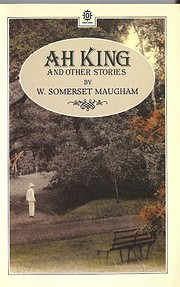

Auf ein Miniaturbild klicken, um zu Google Books zu gelangen.
|
Lädt ... Ah Kingvon W. Somerset Maugham
 Keine aktuelle Diskussion zu diesem Buch. keine Rezensionen | Rezension hinzufügen
Gehört zu Verlagsreihen
Noveller fra Østen blandt udsendte engelske og hollandske koloniembedsmænd, plantageejere, samt deres koner og kærester. Keine Bibliotheksbeschreibungen gefunden. |
Aktuelle DiskussionenKeineBeliebte Umschlagbilder
 Google Books — Lädt ... Google Books — Lädt ...GenresMelvil Decimal System (DDC)823.91Literature English & Old English literatures English fiction Modern Period 1901-1999Klassifikation der Library of Congress [LCC] (USA)BewertungDurchschnitt: (4.6) (4.6)
Bist das du?Werde ein LibraryThing-Autor. |
||||||||||||||||||||||||||||||||||||||||||||||||||||||||||||||||||||||||||||||||||||||||||||||||||||||||||||||||||||||||||
[Final lines:]
''Good-bye, Ah King'' I said. ''I hope you'll find another job soon.''
Then I saw he was crying. I stared at him with amazement. An excellent servant, he had attended to all my wants for six months, but he had always seemed to me strangely detached; he had been as indifferent to my praise as he was unconcerned at my reproofs. It had never occurred to me for an instant that he looked upon me as anything but an odd, rather silly person who paid his wages and gave him board and lodging. That he had any feeling for me had never entered my head. I was embarrassed. I felt a little uncomfortable. I knew that I had often been impatient with him, tiresome and exacting. I had never thought of him as a human being. He wept because he was leaving me. It is for these tears that I now give his name to this collection of stories that I invented while he was travelling with me. To the best of my belief the characters that play their parts in them are creatures of my own fancy.
[Ah King, Preface for The Collected Edition (expanded from the 1933 preface), Heinemann, 1936:]
[First lines of the new part:]
To the best of my belief they are the last stories technically, though I think not quite accurately, called exotic that I shall write. It is indefensible to place a story in a foreign setting merely because it is picturesque. If the incidents you relate might as well have happened in England it is an affectation, if you are an English writer, to put them elsewhere. If you go outside your own country it must be because your story depends on the alien scene. Of course I do not claim that the stories in this book could only have taken place in the part of the world I have described. I think they could have taken place in India or in other colonies of the British Empire; they certainly could not have taken place in England, for they depend on the environment in which the characters chosen find themselves and on the effect upon them of a manner of life which is not quite natural to them.
[…]
I have confined myself to describing the effect on a number of white people of the manner of their lives in certain remote places. But the subject is limited. Life in these places is curious, but it is simple. It is a picture painted with a restricted palette. The writer who treats of subjects that demand the exotic setting finds eventually that he has arrived at the end of them. The characters he has to deal with are often peculiar, for people under these conditions often have the opportunity to develop their idiosyncrasies to a degree that in another situation would be impossible, but they somewhat lack variety. They tend to fall in recognisable types. Even when they are eccentric they are eccentric according to a pattern. The fact is of course that they are ordinary people on whom the same causes have the same effects. You don’t often find in them the complexity that makes those who dwell amid the sophisticated circumstances of cultured life an inexhaustible subject of study.
[From “Looking Back”, Show Magazine, August 1962, p. 100:]
But for him [Gerald Haxton] I should not have got the material for many of the stories I wrote. At least on one occasion he gave me the story ready made. We had gone to Sumatra and were staying at a place which in my story I called Tanah Merah. As usual we were made honorary members of the white man’s club. We generally dined there, but late, since at sundown men gathered at the bar and did not stroll into the dining room till nine. One evening I grew tired of waiting for Gerald, who was with a group of fellows drinking at the bar, and sat down to my dinner. I had nearly finished when he staggered in. “I know I’m drunk,” he said, “but I’ve got a damned good story for you.” He told it to me and I wrote it. I called it “Footprints in the Jungle”. I don't think I can have written it very well; it was a murder story and when it was printed some critics found fault with it because it was very soon obvious who had committed the murder. But I was not trying to write a who-done-it. What interested me was something very different. The woman and her lover had killed her husband, but the crime could never be brought home to them. Though the members of the community, planters, traders, agents, doctors – and their wives – were well aware of the facts, they continued to live on the best of terms with the widow and her lover. They married and, in short, lived happily ever afterwards. I came to know and found them very agreeable. They were kindly and hospitable. I was pretty sure that they had never been troubled by remorse; it was impossible not to like them, for they were very nice. Human nature is very odd.